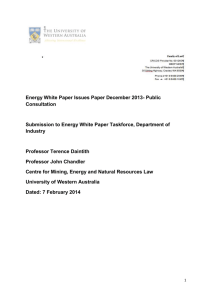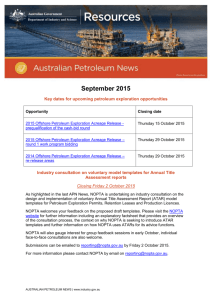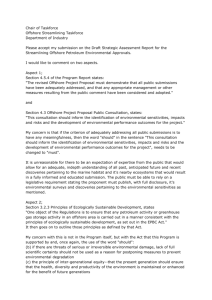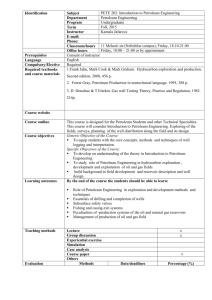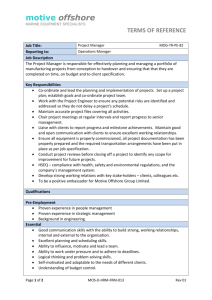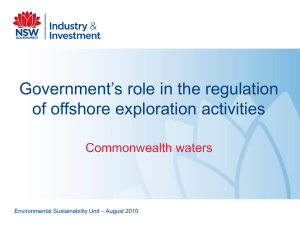DOCX 680 kB - Offshore Petroleum Exploration Acreage Release
advertisement
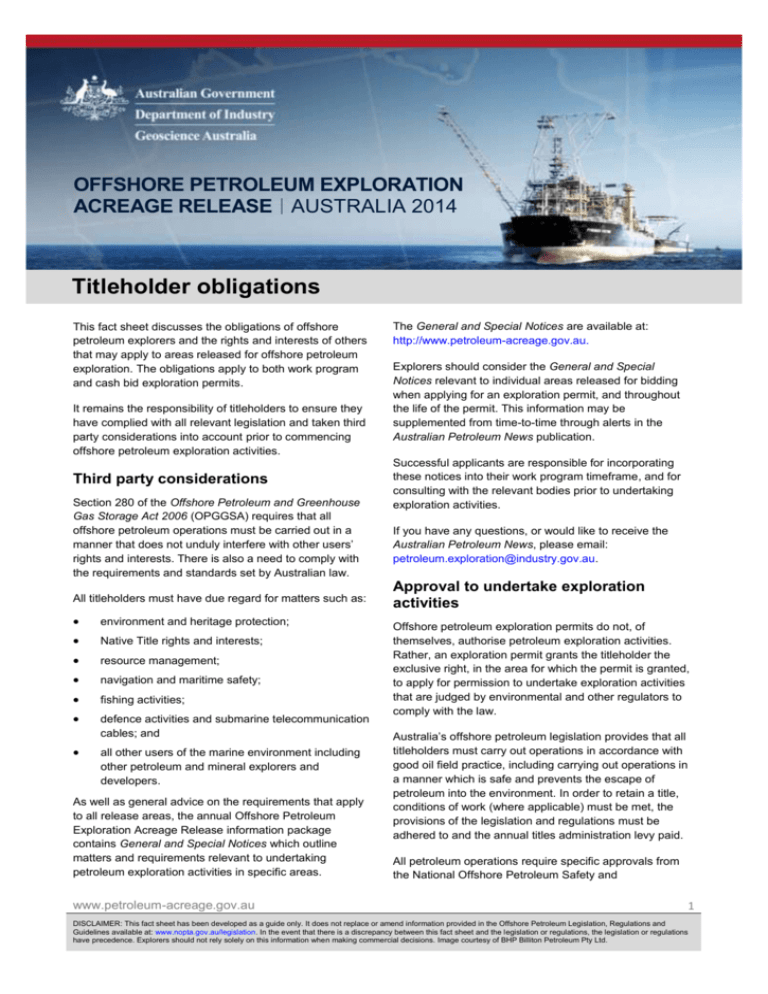
OFFSHORE PETROLEUM EXPLORATION ACREAGE RELEASE AUSTRALIA 2014 Titleholder obligations This fact sheet discusses the obligations of offshore petroleum explorers and the rights and interests of others that may apply to areas released for offshore petroleum exploration. The obligations apply to both work program and cash bid exploration permits. It remains the responsibility of titleholders to ensure they have complied with all relevant legislation and taken third party considerations into account prior to commencing offshore petroleum exploration activities. Third party considerations Section 280 of the Offshore Petroleum and Greenhouse Gas Storage Act 2006 (OPGGSA) requires that all offshore petroleum operations must be carried out in a manner that does not unduly interfere with other users’ rights and interests. There is also a need to comply with the requirements and standards set by Australian law. All titleholders must have due regard for matters such as: environment and heritage protection; Native Title rights and interests; resource management; navigation and maritime safety; fishing activities; defence activities and submarine telecommunication cables; and all other users of the marine environment including other petroleum and mineral explorers and developers. As well as general advice on the requirements that apply to all release areas, the annual Offshore Petroleum Exploration Acreage Release information package contains General and Special Notices which outline matters and requirements relevant to undertaking petroleum exploration activities in specific areas. www.petroleum-acreage.gov.au The General and Special Notices are available at: http://www.petroleum-acreage.gov.au. Explorers should consider the General and Special Notices relevant to individual areas released for bidding when applying for an exploration permit, and throughout the life of the permit. This information may be supplemented from time-to-time through alerts in the Australian Petroleum News publication. Successful applicants are responsible for incorporating these notices into their work program timeframe, and for consulting with the relevant bodies prior to undertaking exploration activities. If you have any questions, or would like to receive the Australian Petroleum News, please email: petroleum.exploration@industry.gov.au. Approval to undertake exploration activities Offshore petroleum exploration permits do not, of themselves, authorise petroleum exploration activities. Rather, an exploration permit grants the titleholder the exclusive right, in the area for which the permit is granted, to apply for permission to undertake exploration activities that are judged by environmental and other regulators to comply with the law. Australia’s offshore petroleum legislation provides that all titleholders must carry out operations in accordance with good oil field practice, including carrying out operations in a manner which is safe and prevents the escape of petroleum into the environment. In order to retain a title, conditions of work (where applicable) must be met, the provisions of the legislation and regulations must be adhered to and the annual titles administration levy paid. All petroleum operations require specific approvals from the National Offshore Petroleum Safety and 1 DISCLAIMER: This fact sheet has been developed as a guide only. It does not replace or amend information provided in the Offshore Petroleum Legislation, Regulations and Guidelines available at: www.nopta.gov.au/legislation. In the event that there is a discrepancy between this fact sheet and the legislation or regulations, the legislation or regulations have precedence. Explorers should not rely solely on this information when making commercial decisions. Image courtesy of BHP Billiton Petroleum Pty Ltd. Environmental Management Authority (NOPSEMA) before the activity commences (e.g. acceptance of a safety case, environment plan, and/or well operations management plan), and may also require further environmental approval. Details of approval requirements are set out in the OPGGSA and associated regulations and the Environment Protection and Biodiversity Conservation Act 1999. Australia’s offshore petroleum regulatory regime places the onus on the operator to demonstrate that exploration for, and extraction of, petroleum resources is undertaken in a safe and environmentally responsible manner. The most common requirement for undertaking petroleum exploration activities under a title is for companies to ensure they hold the relevant approvals and notify the relevant Commonwealth/state/territory government department or organisation prior to the commencement of a seismic survey and/or drilling of an offshore well. Where appropriate, conditions may be included in an exploration permit title. Failure to comply with conditions of an exploration permit title may result in commencement of permit cancellation proceedings. Additional information is contained in: the OPGGSA, as amended from time to time, the associated Explanatory Memoranda and Second Reading Speeches; the Offshore Petroleum and Greenhouse Gas Storage (Safety) Regulations 2009; the Offshore Petroleum and Greenhouse Gas Storage (Environment) Regulations 2009; the Offshore Petroleum and Greenhouse Gas Storage (Resource Management and Administration) Regulations 2011 (includes requirements relating to well operations, field development plans and data management); and administrative guidelines issued to assist with the administration of the legislation. An electronic compendium of legislation and regulations and associated guidelines governing the offshore petroleum industry is available at: www.nopta.gov.au/legislation/guidelines.html Offshore safety and environment regime National Offshore Petroleum Safety and Environmental Management Authority The National Offshore Petroleum Safety and Environmental Management Authority (NOPSEMA) has regulatory responsibility for occupational health and safety, structural integrity of facilities, wells and wellrelated equipment, environmental management and day- www.petroleum-acreage.gov.au AUSTRALIA 2014 to-day operations of offshore petroleum facilities in Commonwealth waters, and in coastal waters where state and Northern Territory powers have been conferred. NOPSEMA is accountable to the Commonwealth Minister for Industry. NOPSEMA has published guidelines for offshore operations, which are available on its website, http://www.nopsema.gov.au Safety case regime Safety in the Australian offshore petroleum industry is regulated under a safety case regime underpinned by the Offshore Petroleum and Greenhouse Gas Storage (Safety) Regulations 2009. The objective based regime is founded on the principle that the legislation sets the broad safety goals to be attained; the operator of the facility develops the most appropriate methods of achieving those goals for their facility; with the ongoing management of safety being the responsibility of the operator, not the regulator. The role of the regulator is to assess whether the operator’s proposed measures are appropriate and to monitor and enforce compliance with duties of care. Current best practice in offshore safety regulation involves the operator of an offshore facility preparing a safety case to manage occupational health and safety at a facility. The safety case describes the facility, identifies hazards and risks, how the risks are controlled and describes the safety management system in place to ensure that controls are effectively and consistently applied to maintain health and safety. The safety case is submitted to the regulator (NOPSEMA) for assessment. Operations must not be carried out at a facility without an accepted safety case in force. Once a safety case has been accepted by the regulator, it forms the “rules” with which the operator must comply in operation of the facility and against which the operations will be audited by the regulator. For further information on offshore safety matters contact: NOPSEMA GPO Box 2568, PERTH WA 6001 Telephone: +61 8 6188 8700 Website: www.nopsema.gov.au Manager – Environment, Safety & Security Resources Division Department of Industry GPO Box 1564 CANBERRA ACT 2601 Telephone: +61 2 6243 7802 Website: http://www.industry.gov.au/resource/UpstreamPetroleum/Offs horePetroleumSafety/Pages/default.aspx 2 Offshore Petroleum Exploration Acreage Release Offshore facility security Preventive security arrangements for Australian offshore facilities are regulated under the Maritime Transport and Offshore Facilities Security Act 2003 and the Maritime Transport and Offshore Facilities Security Regulations 2003. Consolidations of this legislation may be found at: www.comlaw.gov.au. This legislation provides a framework for operators of certain offshore facilities, ports, and ships, and a range of associated service providers, to undertake security risk assessments and implement preventive security plans. Security plans set out the security measures and procedures to be implemented to safeguard maritime transport and offshore facilities against acts of unlawful interference. Security plans also identify security measures to be used when different maritime security levels are in force. The Office of Transport Security within the Department of Infrastructure and Regional Development is responsible for assessing and approving these plans. Organisations involved with offshore petroleum production need to be aware of this legislation. In particular, these organisations should assess at an early stage whether any of their activities are likely to be covered by the requirement to prepare and submit a security plan. Approval of security plans can take up to 90 days, and it is an offence for an offshore industry participant to operate without an approved security plan in force when one is required. Even if an industry participant is not required to have its own plan it may be affected by another’s plan. Protection of the Sea (Prevention of Pollution from Ships) Act 1983; and Historic Shipwrecks Act 1976. Of particular relevance to the oil and gas industry are the complementary requirements of the OPGGSA and the EPBC Act. Under these two Acts, there are four main environmental approvals that may be required for petroleum industry activities: an Environment Plan under the Offshore Petroleum and Greenhouse Gas Storage (Environment) Regulations 2009 is required for every petroleum activity; approval under Chapter 4 of the EPBC Act to undertake an activity that is likely to have a significant impact on a matter of National Environmental Significance; permits under Chapter 5, Part 13, of the EPBC Act to undertake activities that may potentially affect protected species, in particular cetaceans (whales and dolphins); and permits under Chapter 5, Part 15, Division 4, of the EPBC Act to carry out activities in a Commonwealth Marine Reserve. For further information on environment related titleholder obligations please see: http://www.industry.gov.au/resource/UpstreamPetroleum/ OffshorePetroleumEnvironment/Pages/default.aspx and http://www.comlaw.gov.au/Series/C2004A00485 Further information on offshore facility security matters is available at www.infrastructure.gov.au/transport/security/oil_and_gas/i ndex.aspx or by contacting the Office of Transport Security: Transport.Security@infrastructure.gov.au with attention to “Offshore Oil and Gas”. Telephone Security: From outside Australia: Cabotage: From outside Australia: 1300 307 288 +61 2 6274 8187 1300 307 761 +61 2 6274 8189 Environment protection requirements Australian Government legislation relevant to environmental management of offshore petroleum exploration and development activities includes: OPGGSA; Environment Protection and Biodiversity Conservation Act 1999 (EPBC Act); Environment Protection (Sea Dumping) Act 1981; www.petroleum-acreage.gov.au AUSTRALIA 2014 3 Offshore Petroleum Exploration Acreage Release
